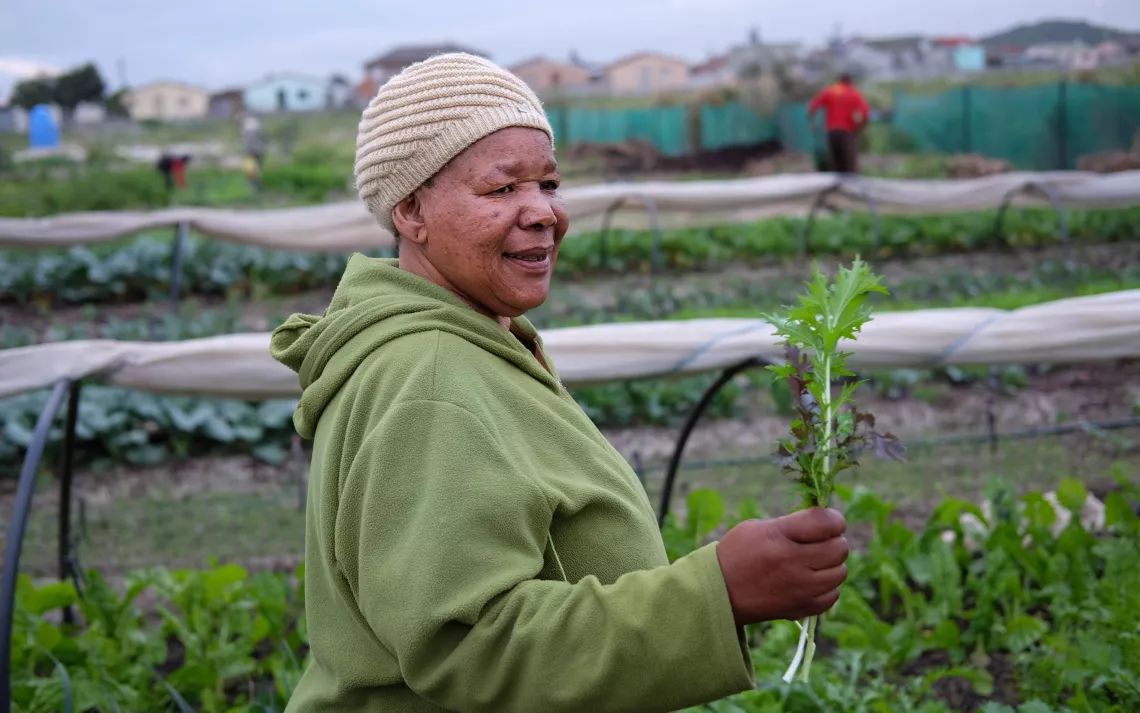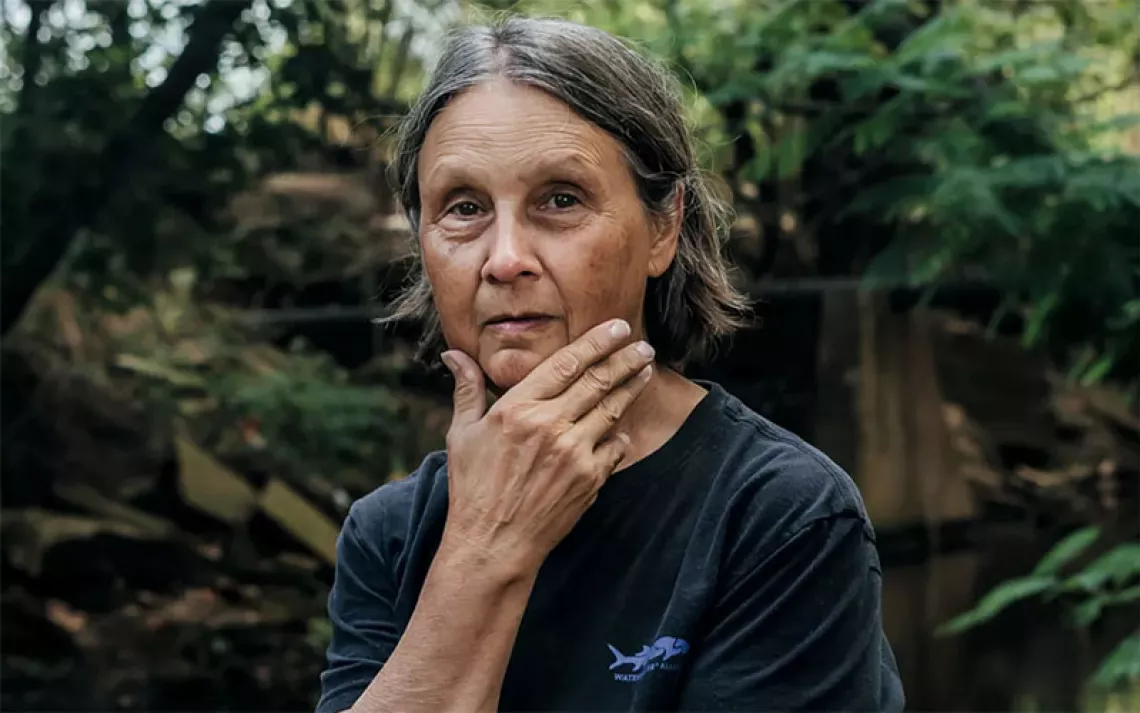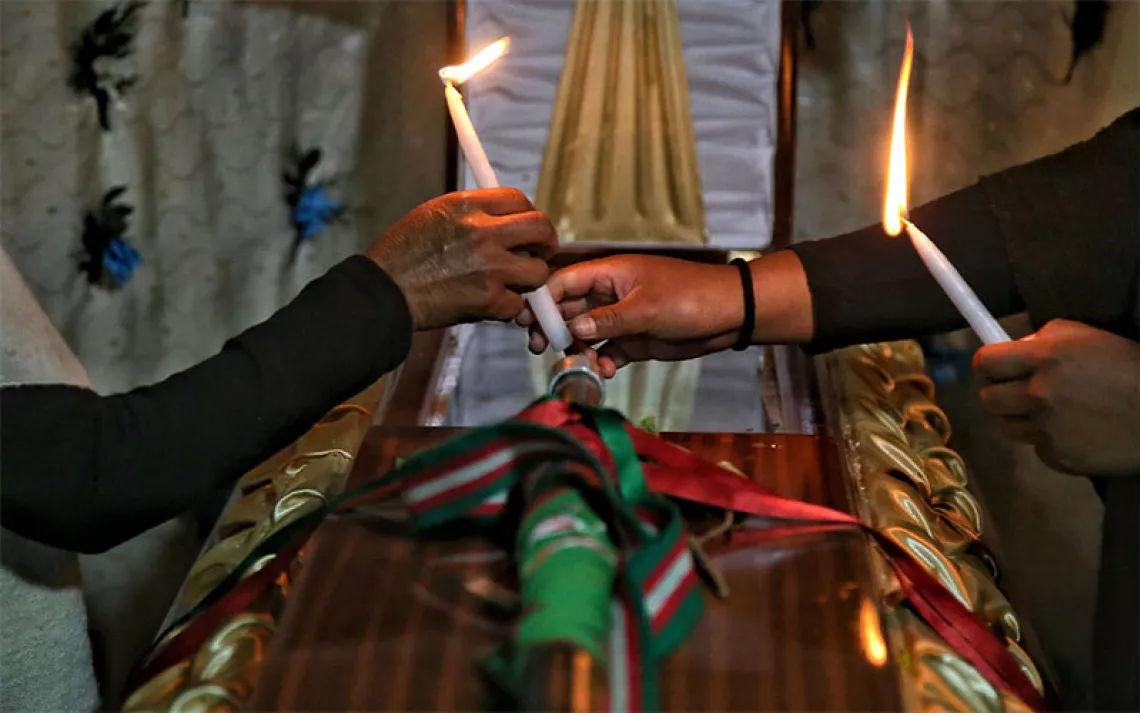A Model of World Food Day
How a grassroots leader in Cape Town combats hunger—and climate change—through urban gardens

Christina Kaba at community garden Moya We Khaya (Xhosa for "Spirit of the home") in Cape Town, South Africa.
|Photos courtesy of Fredrik Sjöstrand/Momenta
Sometimes Christina Kaba rises as early as one in the morning to get a head start on watering her sprawling vegetable garden. She works alone in the dark, her crops dimly illuminated by the lights of adjacent Manyanani Peace Park.
“If you want to do things, do them with all your heart,” said Kaba, who acts as chief executive officer of Abalimi Bezekhaya, an urban farming and environmental action organization working throughout Cape Town’s townships. The grassroots NGO, which translates to “farmers of the home” in Xhosa, supports a variety of home and community gardens via local organic supply centers, heavily subsidized trainings, and ongoing guidance and assessments.
Kaba is one of many food-security champions across the globe celebrated by UN World Food Day, an international initiative to promote action and awareness. A seasoned gardener, the 67-year-old has spent decades combating hunger by training Cape Town’s most poverty-stricken residents—many of whom live within food deserts—to grow their own vegetables. In the process, Kaba has developed a network of community gardens throughout Cape Town’s poorest neighborhoods, whose citizen gardeners trade tips and tricks, split manure and electricity expenses, and, once their efforts bear fruit, share meals.
In many communities, fresh, affordable produce is a pipe dream. Especially in South Africa, where 54 percent of households are at risk of or have experienced hunger. Beyond the price tags on the vegetables themselves, traveling to and from grocery stores can be expensive, time-intensive, and sometimes even dangerous. Malnutrition and obesity are simultaneous side effects of this lack of access. With the changing climate, such vulnerabilities will only worsen worldwide, experts say, and the poorest and most food insecure will bear the greatest burden.
Unless communities make serious efforts to bolster resilience, one in five more people will be at risk of hunger by 2050, according to the World Food Programme.
That’s why this year’s World Food Day theme—“Climate is changing. Food and agriculture must too”—is essentially a call to action. The message emphasizes strengthening sustainable farming methods and decreasing food waste, especially for small-scale operations. After all, environmental injustice, already a significant element of climate change, is especially pronounced when it comes to world hunger.
The day was established in 1979 to commemorate the founding of the Food and Agriculture Organization of the United Nations (FAO) on October 16, 1945. UN World Food Day also promotes awareness of food insecurity and outreach to those suffering from it.
This year’s theme of climate action particularly resonated with Kaba. Last summer, amid South Africa’s ongoing drought, the worst in 30 years, Abalimi’s farmers saw many of their tomatoes and green peppers become scorched and inedible.
“Before, we thought these things were happening overseas, not to us,” she said. “But last year was very, very hot.”
Unlike in agriculture-friendly central Cape Town, the topsoil of Khayelitsha, the nation’s largest and fastest-growing township, is notoriously sandy—as it is in most neighborhoods situated on the barren and windswept Cape Flats. Beginning in the 1950s, South Africa’s apartheid government forcefully evicted blacks and other people of color from the city center and re-situated them along Cape Town’s eastern outskirts. These removals, sanctioned by the racially segregating Group Areas Act, resulted in the poverty-stricken townships of today. In the decades following the 1994 democratic transition, poor farming conditions have perpetuated this spatial apartheid legacy—and it’s only becoming more and more exacerbated, thanks to warming temperatures.
In preparation for what predictions indicate will be another extremely dry season, Kaba has begun reintroducing an age-old technique in Khayelitsha to save water: trench-bed gardening. Farmers bury cardboard and other repurposed rubbish between their nutrient-rich soil beds and the sand below. This barrier holds in liquid, allowing plants to survive up to three days without watering.

Though the situation at hand is particularly dire, such sustainability initiatives have steered Abalimi’s mission, ever since its origins in the early 1980s. The organization’s trainers teach exclusively organic methods, not only because of their environmental and health benefits, but also, Kaba says, because they’re cheaper. Low overhead costs ensure that even the most impoverished township residents can start their plots.
“There is no poor,” she said. “Poor is only in your mind.”
Born on a farm in the KwaZulu-Natal (KZN) Province, Kaba dropped out of school at 15 to become a garden laborer and domestic worker. After arriving in Cape Town, she got by cleaning houses in the upscale Sea Point neighborhood.
When Kaba applied to become manager of Abalimi’s then new Khayelitsha Garden Center in 1989, she didn’t have any official training or certificate, just decades of personal experience. At first, she focused on teaching individuals how to cultivate home gardens to feed their families. Thanks to those efforts, rows of cabbage lined compact backyards, and spinach sprouted from repurposed tires. No space, she proselytized, was too small for a modest harvest. Kaba swiftly rose up the ranks from garden center manager to educational trainer to CEO. More than 25 years later, she finds her life course to be fully aligned with the philosophy of Abalimi, and with Khayelitsha’s urban farming pioneers.
Originally an offshoot of Catholic Welfare and Development, Abalimi grew quickly, in large part thanks to Kaba’s tireless leadership and activism. In 1997, she brokered deals with the local municipality as well as Eskom, South Africa’s leading power company, to form Abalimi’s first community garden on a vacant plot next to a powerline. Today, the established nonprofit supports a variety of training programs, greening projects, organic supply centers, and community farms spanning the Khayelitsha, Nyanga, and Philippi townships.
Every Tuesday, an affiliated operation called Harvest of Hope delivers fresh produce, harvested from the more than 75 plots comprising Abalimi’s garden network, to subscribers throughout Cape Town, its affluent suburbs, and within the townships themselves. Founded in 2009, the guaranteed purchase scheme provides a stable income to farmers in a community where the unemployment rate hovers above 50 percent.
“It's so important because the soil is where they can create their jobs,” said Kaba. “The soil is gold.”
Kaba can often be found in Harvest of Hope’s pack shed, diligently inspecting spring onions or trimming the roots of kohlrabi. She typically sports a cropped blazer, tailored dress, and colorful head wrap, appearing like she’s dressed for an official meeting rather than for sorting the latest harvest. For Kaba, the vegetables’ quality is worth the extra check—a final safeguard between the farmers’ livelihood and their customers.
Her thoroughness persists in a wide range of other grassroots efforts, too. She’s sat on neighborhood councils, founded numerous tree-planting initiatives, and even spearheaded the establishment of Khayelitsha’s first community park. Kaba says she’s happiest when she’s able to give back, straddling the line between social worker and farmer.
“When people are in her community and they have nothing, they go to her,” said Nancy Maqungo, a longtime friend and Abalimi chairperson. “They know that even if she has nothing, she will make means to help. She's that type of person.”
Kaba’s long litany of accolades reflects this legacy. In 2001, she was named grocery store chain Shoprite Checkers’ “Woman of the Year.” Most recently, she received the honorary title of 2015’s “Best Subsistence Producer” from South Africa’s Department of Agriculture, Forestry, and Fisheries. The list goes on.
Her latest community garden project, Moya We Khaya, occupies one hectare of land in Khayelitsha and produces almost a quarter of Harvest of Hope’s vegetables. Since its 2014 founding, the farm transformed from an unkempt sandy plot into Abalimi’s flagship garden. It is there that Kaba tends to her own vegetables, hosts community events, and imparts her overflowing well of knowledge to fellow gardeners.
“This last project, I did it for myself and my community,” said Kaba. “We—all of us—need to take it in our hands.”
Her stalwart leadership has forever altered Cape Town’s urban farming landscape—embodying World Food Day’s call for climate change resilience in more ways than one.

 The Magazine of The Sierra Club
The Magazine of The Sierra Club



